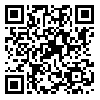BibTeX | RIS | EndNote | Medlars | ProCite | Reference Manager | RefWorks
Send citation to:
URL: http://ijme.tums.ac.ir/article-1-100-en.html
2- Medical Ethics Department, Shiraz University of Medical Sciences, Shiraz, Iran.
Birth of a poor prognosis neonate (premature and/or congenitally affected) may potentially burden the family and/or society with many ethical, social, legal, etc challenges. Most of the decision making criteria used in handling the care of these neonates, such as disability, quality of life, etc., are multidimensional and heavily ethical bearing. In this study, we have tried to explore and present a perfect view on the existing challenges and different dimensions of the discussed criteria. In the end, the prominent standpoint of the Islamic school in confronting a severely disabled newborn has been introduced and analyzed. Most related discussions boil down to some fundamental and unanswered questions, for instance whether human beings should be permitted to make decisions about the life of severely diseased neonates, the decision making criteria themselves and their appropriateness, etc. Even though many scientists have theorized on the subject, a multilateral explanation of life and death criterion has not been presented yet. One thing is for certain and that is, in answering the basic questions of the subject, our present knowledge and experience is limited and insufficient. The authors have tried to show that despite many western views, decision making about the life of a neonate has no place in Islamic teachings, since it could be considered an unauthorized human action. Instead, it is proposed that any attempt to provide an ethical rationale, while utilizing today's science and technology, be in compliance with God's commandments.
Accepted: 2013/10/14 | Published: 2017/09/27
| Rights and permissions | |
 |
This work is licensed under a Creative Commons Attribution-NonCommercial 4.0 International License. |





